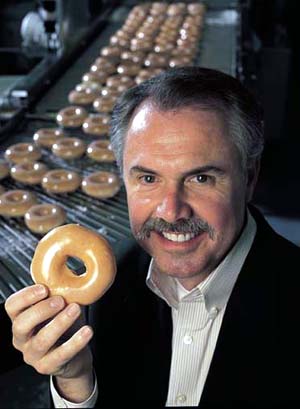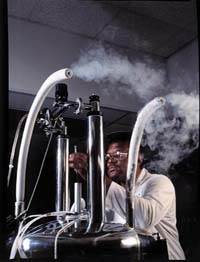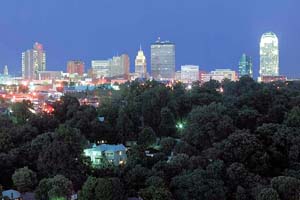 Photo at right: Scott Livengood is chairman Photo at right: Scott Livengood is chairman
of one of America's hottest businesses,
Krispy Kreme Doughnuts.
Read
more about Krispy Kreme,
one of the hottest IPOs of the year
Sweet
Deals
Are Rising In
Winston-Salem
The city's historic values
foster a new generation
of growing companies
By Jerry Blackwelder
Predicting the next corporate superstar from
Winston-Salem to join the ranks of R.J. Reynolds, Piedmont Airlines
and Wachovia is a difficult task.
Many are betting on Krispy Kreme, the sweet Southern sensation that
has taken Wall Street and the rest of the country by storm since going
public last year. Others might choose Targacept or Amplistar, two
leaders among the city’s emerging biotechnology research businesses.
It might be an established Winston-Salem institution like BB&T,
already the nation’s 16th largest bank. Or a newcomer from among the
500 new companies born in Winston-Salem in the past five years.
One thing’s for sure. North Carolina’s fifth-largest city has no
lack of candidates. The entrepreneurial spirit that drives companies
incubated in Winston-Salem to grow up to be national and worldwide
industry leaders shows no sign of slowing down.
That driving ambition for commerce began soon after the Moravians came
to settle the town of Salem in the 1750s. As the early pioneers
migrated west, Salem became known as a trading center for the newly
populated backcountry. Salem’s twin city, Winston, was founded in
1849 as the county seat of the newly formed Forsyth County. The
arrival of the railroad put manufacturing on center stage as the chief
enterprise in Winston, as companies sprang up to take advantage of the
rich, fertile Piedmont soil to transform agricultural output into
textiles, furniture and tobacco products. The thriving communities
merged in 1913, creating the city of Winston-Salem.
 Growing
Up and Out Growing
Up and Out
Photo at right: Jackie Greene, a senior research
and development staff chemist with Targacept, works with a nuclear
resonance spectrometer.
One of the most important priorities of Winston-Salem’s founders
that have stood the test of time was a strong emphasis on education.
Salem College was launched four years before America declared its
independence, ranking it among the 15 oldest institutions of higher
education in the entire country. Through the centuries since,
descendants of the Moravians have continued the tradition and carried
on the work of their ancestors.
Today the city is home to a half-dozen colleges and universities,
including a pair of University of North Carolina member institutions
and one of the nation’s premier private universities. Each year more
than 14,000 collegians come to Wake Forest University, Winston-Salem
State University, the North Carolina School of the Arts, Salem
College, Forsyth Technical Community College and Piedmont Bible
College to study everything from anthropology to computer science to
medicine to modern dance.
Forsyth Technical Community College has excelled at turning out
graduates with practical skills for the 21st Century workplace. FTCC
is North Carolina’s only community college to have established
partnerships with Cisco Systems, Microsoft and Novell, enabling the
college to certify students in many varied technological fields.
Forsyth Tech’s reputation as a leader in technology training was
enhanced with the announcement in May of the formation of an
Information Technology Center. Funded by a corporate grant and
proceeds from the $3.1 billion universities and community colleges
bond referendum last November, the center will prepare students to
become certified technical trainers and certified computer
technicians.
It is clear that Winston-Salem understands and appreciates the value
of education to its future. As evidence of its cutting-edge approach,
the city’s post-secondary institutions joined with the county public
schools, library, hospitals and local government to form WinstonNet, a
community-based high-speed fiber network that makes Winston-Salem a
truly connected city.
The emphasis on technology is proof that Winston-Salem can adjust to a
changing economic climate. In fact, Winston-Salem learned early on the
effects of a system where corporate consolidation is a way of life
from R.J. Reynolds Tobacco Co., a longtime leading employer, and the
consolidation of homegrown Piedmont Airlines with US Airways. With
that experience, city leaders took the news in stride when Wachovia,
for years a Winston-Salem institution known for its industry
excellence and local corporate generosity, announced plans to merge.
The term “reinventing” is used a lot in Winston-Salem, which gave
birth to corporate giants that eventually moved on to make room for
new ones. Those who cited the loss of Wachovia’s corporate
headquarters as a blow to Winston-Salem’s overall economic
well-being were premature, believes Wake Forest University President
Dr. Thomas Hearn, who also serves as chairman of Idealliance, the
city’s technology umbrella organization and manager of the city’s
Piedmont Triad Research Park.
“No community is immune
from corporate consolidation,” Hearn says, “but Winston-Salem has
coped quite well with reinventing itself, and there are reasons for
optimism.”
Operating on the recommendation of a “technology blueprint”
sponsored by the Chamber of Commerce, Hearn recruited Bill Dean to
come to Winston-Salem from the high-tech center of Huntsville, Ala.,
to preside over Idealliance as it seeks to transform Winston-Salem
into a bona fide technology community. While Idealliance and
Winston-Salem Business Inc. continue their efforts to recruit
technology companies from outside the area, Dean maintains that a
successful transformation will best come from within, mostly at the
grassroots level, through small groups of entrepreneurs and investors
working together to exploit discoveries and inventions coming
initially from Wake Forest’s School of Medicine. Following that
lead, George Little, current chairman of Winston-Salem Business Inc.
and a senior partner in the international law firm of Kilpatrick
Stockton, which led Krispy Kreme through its successful IPO in 2000,
notes that his firm is seriously committed to the technology effort,
as evidenced by the presence of 17 full-time intellectual property
lawyers in its Winston-Salem office.
That’s an opinion shared by Gayle Anderson, president of the
Winston-Salem Chamber of Commerce. “Winston-Salem has a tradition of
starting companies that grow wings and then move on,” she says.
Noting that the consolidations of corporate institutions RJR and
Piedmont Airlines resulted in the new companies maintaining a strong
Winston-Salem presence, Anderson says she is working with Wachovia
officials to ensure the city maintains and even builds on its current
Wachovia employee base of more than 5,000.
Even with the loss of Wachovia’s corporate headquarters,
Winston-Salem’s financial services’ identity as the country’s
ninth-largest financial center remains strong. Bob Leak, president of
Winston-Salem Business Inc., cites BB&T, Piedmont Federal Savings
and Loan — North Carolina’s largest savings and loan — and
Truliant and Allegacy, two of the state’s largest credit unions, as
evidence of the community’s commitment to financial services.
“We are optimistic about continued growth in Winston-Salem,” says
Steve Wiggs, president of BB&T’s Triad Region, who reports
increased retail activity and mortgage lending coupled with strong
momentum as evidence of small business growth.
 Services
Overtake Manufacturing Services
Overtake Manufacturing
Photo at left: Winston-Salem's
population is 173,568, with Forsyth County totaling 291,846
Reinventing itself has resulted in a shift from the city’s image as
a traditional manufacturing center. Service industries have overtaken
manufacturing as the area’s largest provider of jobs, now accounting
for almost 30 percent of the overall work force. The diversified
economic base now encompasses apparel and other textiles,
transportation, computer-related services, industrial and electrical
equipment, tobacco, finance and education. Health care is the area’s
largest employer with the North Carolina Baptist Hospital leading the
way. Novant Health Systems is the area’s third largest employer.
Novant’s Forsyth Medical Center and Baptist Hospital have both been
designated as Class IV trauma centers, a top national rating.
The city’s excellent reputation for medical services is a magnet for
some people, says Nancy Dunn, founder of Aladdin Travel & Meeting
Planners and past chair of the Chamber of Commerce. “Because of our
large medical community, people come here, stay and even retire
here,” Dunn says.
As a small business incubator, it’s hard to argue with
Winston-Salem’s success — the city has averaged more than a
hundred new business creations for five consecutive years. Emma Graham
has seen Graham & Boles, the real estate firm she helped launch in
1990, grow to include 60 employees and an active relocation department
that routinely fields calls from companies moving to the area.
Perhaps they are following the real estate law that location is
everything. Situated midway between Washington and Atlanta (and also
midway between Raleigh and Charlotte), Winston-Salem is the heart of
the fastest growing area of the country. In fact, half the population
of the United States and a host of industrial and consumer markets are
within a five-hour drive or a two-hour flight. Interstates 40 and
Business 40 anchor the area highway system with easy access to the
north/south routes of I-85 and I-77. The city’s Smith Reynolds
airport accommodates corporate and private aircraft, while commercial
service is just 20 minutes away at Piedmont Triad International
Airport, which added daily nonstop service to Toronto in June and has
been selected by FedEx as the hub of all its Atlantic Coast
operations.
Winston-Salem is also well positioned to become the gateway to North
Carolina Wine Country. At ground zero of a statewide effort to
re-establish North Carolina as a leading grape and wine producing
state (it was the nation’s leading producer before the Civil War),
Winston-Salem is already home to two established wineries and is
within a 45-minute drive of most of the new vineyards and wineries
being established in the state.
Rail service, a key factor in the city’s establishing itself
originally as a manufacturing center, remains important to
Winston-Salem’s long-term economic health, says Murray Greason, a
senior partner with the law firm of Womble Carlyle Sandridge and Rice
and incoming chair of the Chamber of Commerce. High on his agenda is
re-establishing passenger rail service with other major North Carolina
cities and eventually becoming a link in a high-speed rail network.
Good transportation is one of four key factors that attract new
companies to Winston-Salem, according to Winston-Salem Business
Inc.’s Bob Leak. He cites the city’s relatively low construction
costs, diversified labor force and the area’s quality of life as
other appealing factors for new industry.
In fact, construction costs in Winston-Salem stack up favorably to
similar areas. In a Kemper Insurance Companies study of location cost
factors, Winston-Salem rated among the 10 least expensive sites in the
United States.
Winston-Salem has demonstrated its attractiveness to manufacturing and
research and development companies looking to expand or relocate with
the creation of Union Cross Business Park, a “joint venture to
diversify our local economy to get through any economic downturn,”
Leak says. The 400-acre park sits adjacent to Highway 311 and now has
seven tenants and a new 88,000 square-foot spec building available for
occupancy.
A Smart Place to Live
Quality of life issues are subjective and harder to measure, but by
all accounts Winston-Salem has established itself as a good place to
live, work and raise a family.
The Winston-Salem-Forsyth County Public School System is comprised of
39 elementary schools, 16 middle schools and 11 high schools. More
than 3,200 teachers instruct a student population of 44,500. The
school system’s budget exceeds $300 million each year.
Creating the best possible public educational system is a top priority
of the Winston-Salem business community, to the point that hundreds of
corporate managers now spend an hour every week personally working
with students in the classroom.
“We view public education as a fundamental challenge for economic
development,” says the chamber’s Gayle Anderson. To prove it,
corporate leaders, in conjunction with Wake Forest University,
developed a long-range Education Technology Blueprint as a means to
improve public education. With Wachovia leading the charge, a $38
million fund-raising campaign was launched with a goal of becoming one
of the country’s top school systems by making computers available to
students in every school. Ranked by Yahoo Internet Life Magazine as one of the most web-wired
universities in the country, Wake Forest issues new laptop computers
to incoming freshmen and replaces them two years later. Now those IBM
computers are upgraded and refurbished, then placed in public school
classrooms.
The Education Blueprint also calls for hands-on involvement by the
business community, and its members have responded in droves. During
the past school near an astounding 950 volunteers made weekly visits
to public schools to tutor kindergarten to second-grade students.
Gayle Anderson proudly points to the accomplishment of her own
assigned kindergarten charge, whose learning level jumped from two
years, nine months to four years, six months after a year’s
tutelage.
BB&T’s Steve Wiggs says his bank will double its volunteer
commitment to the program this year. Wiggs, father of two Forsyth
public school students, says the program “is helping close the
achievement gap among our kids, which is part of our whole economic
development effort.”
Corporate commitment to improving the quality of life in Winston-Salem
is nothing new. Here corporate funding and foundation grants are a
proud tradition being carried on today by the likes of Krispy Kreme,
which gave $30,000 to the North Carolina School of the Arts to fund
its film students’ screening sessions, and the Thomas H. Davis
Foundation (named for the founder of Piedmont Airlines), which awarded
$100,000 to Forsyth Tech to endow its new Internet Technology Center.
Nor are corporate concerns limited to improving educational
opportunities. It is not at all unusual to find corporate managers
devoting time to serve on the boards of the United Way, Hospice, Red
Cross, American Heart Association and Habitat for Humanity.
So too do the arts benefit from corporate stewardship, resulting in
the unequalled reputation Winston-Salem enjoys for its arts and
cultural opportunities. In the city with the oldest established arts
council in the country, residents and visitors can explore
Winston-Salem as the Moravians saw it in Old Salem, a recreated living
history village downtown. Or take in R.J. Reynolds’ American art
collection and the mansion and gardens surrounding it. The
Southeastern Center for Contemporary Art’s galleries exhibit the
best of today’s contemporary art and the Delta Arts Center at
Winston-Salem State University showcases the finest African-American
culture. Winston-Salem is home to a new Museum of Anthropology, the
state’s only museum dedicated to the study of world cultures; and
Sci-Works, a hands-on, interactive science museum situated on 15 acres
of environmental park land.
When you ask Winston-Salem’s corporate leaders to explain what makes
the city unique, many cite the outstanding arts and cultural
activities as the key distinguishing factor. Others point to the
lifetime learning opportunities from the higher education institutions
based here or local city and county government, which has demonstrated
its support for the business community time and time again and does
its part by maintaining a AAA bond rating.
To many it’s a sense of caring that sets Winston-Salem apart from
other cities.
Wiggs, who has lived in 11 cities during his 23 years with BB&T,
says he is “most impressed with Winston-Salem because of the support
of the community in making it successful.” Winston-Salem, he
maintains, “has a large city feel but small community commitment to
each other.”
Scott Livengood, chairman of Krispy Kreme, is so sold on Winston-Salem
as the “greatest place in the world to live and raise a family”
that he uses the quality of life as a recruiting tool for new
employees.
As Winston-Salem continually reinvents itself and responds to a
changing economic climate, the short- and long-term future holds great
promise. The city expects the planned construction of a FedEx regional
hub at Piedmont Triad International Airport to bring an economic boom,
as it has in other areas. Gayle Anderson believes the hub will bring
expansion by existing companies and the relocation to the area by
industries requiring high-speed efficiency such as laptop computer
repair and those companies requiring special handling, such as medical
testing for new drugs and online pharmacies.
Winston-Salem’s economic developers agree future growth will come in
five key areas — high-tech manufacturing, health care, information
technology, financial services and biomedical research and
development.
Earlier this year the city accustomed to reinventing itself unveiled a
new slogan. As is typical, the slogan emerged from a joint
collaboration by city government, the business community, tourism
officials and arts organizations. The end result?
“O! Winston-Salem. Now That’s Living.”
With that, it’s hard to argue.
Return to magazine index

|
|

